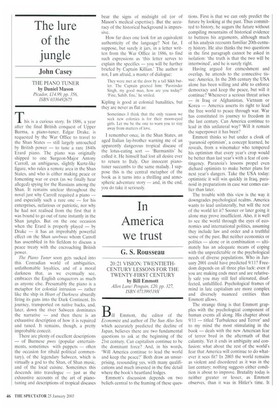The lure of the jungle
John Casey
THE PIANO TUNER
by Daniel Mason Picador, £14.99, pp. 356,
ISBN 0330492675
This is a curious story. In 1886, a year after the final British conquest of Upper Burma, a piano-tuner, Edgar Drake, is requested by the War Office to travel to the Shan States — still largely untouched by British power — to tune a rare 1840s Erard piano. The piano was originally shipped to one Surgeon-Major Antony Carroll, an ambiguous, slightly Kurtz-like figure, who rules a remote area in the Shan States, and who is either making peace or fomenting war or even (as we finally hear alleged) spying for the Russians among the Shan. It remains unclear throughout the novel just why Carroll required a piano — and especially such a rare one — for his enterprises, nefarious or patriotic, nor why he had not realised from the first that it was bound to go out of tune instantly in the Shan jungles. But on the one occasion when the Erard is properly played — by Drake — it has an improbably powerful effect on the Shan sawhwas whom Carroll has assembled in his fiefdom to discuss a peace treaty with the encroaching British power.
The Piano Tuner soon gets sucked into this Conradian world of ambiguities, unfathomable loyalties, and of a moral darkness that, as we eventually see, embraces the English conquerors as much as anyone else. Presumably the piano is a metaphor for colonial intrusion — rather like the ship in Heart of Darkness absurdly firing its guns into the Dark Continent. Its journey, transported on native backs, and, later, down the river Salween dominates the narrative — and then there is an exhaustive description of how it is repaired and tuned. It remains, though, a pretty improbable conceit.
There are plenty of excellent descriptions — of Burmese pwes (popular entertainments, sometimes with puppets — often the occasion for ribald political commentary), of the legendary Salween, which is virtually a god to the Shan, of Shan music, and of the local cuisine. Sometimes this descends into travelogue — just as the exhaustive accounts of the art of pianotuning and descriptions of tropical diseases
bear the signs of midnight oil (or of Mason's medical expertise). But the accuracy of the historical background is impressive.
How far does one look for an equivalent authenticity of the language? Not far, I suppose, but surely it jars, in a letter written from the War Office in 1886, to find such expressions as 'this letter serves to explain the specifics — you will be further briefed by Captain Killian.' The author is not, I am afraid, a master of dialogue:
They were met at the door by a tall Sikh butler. The Captain greeted him: Tavninder Singh, my good man, how are you today?' 'Fine, Sahib, fine,' he smiled.
Kipling is good at colonial banalities, but they are never as flat as:
Sometimes I think that the only reason we seek new colonies is for their moon-eyed girls. Let me be the one to warn you to stay away from matters of love.
I remember once, in the Shan States, an aged Italian lay-brother warning me of an apparently dangerous tropical disease of the lotus-eating sort — `Burmanitis' he called it. He himself had lost all desire ever to return to Italy. Our innocent pianotuner succumbs to the same malady. I suppose this is the central metaphor of the book as it turns into a thrilling and atmospheric adventure story — and, in the end, you do take it seriously.


















































































 Previous page
Previous page